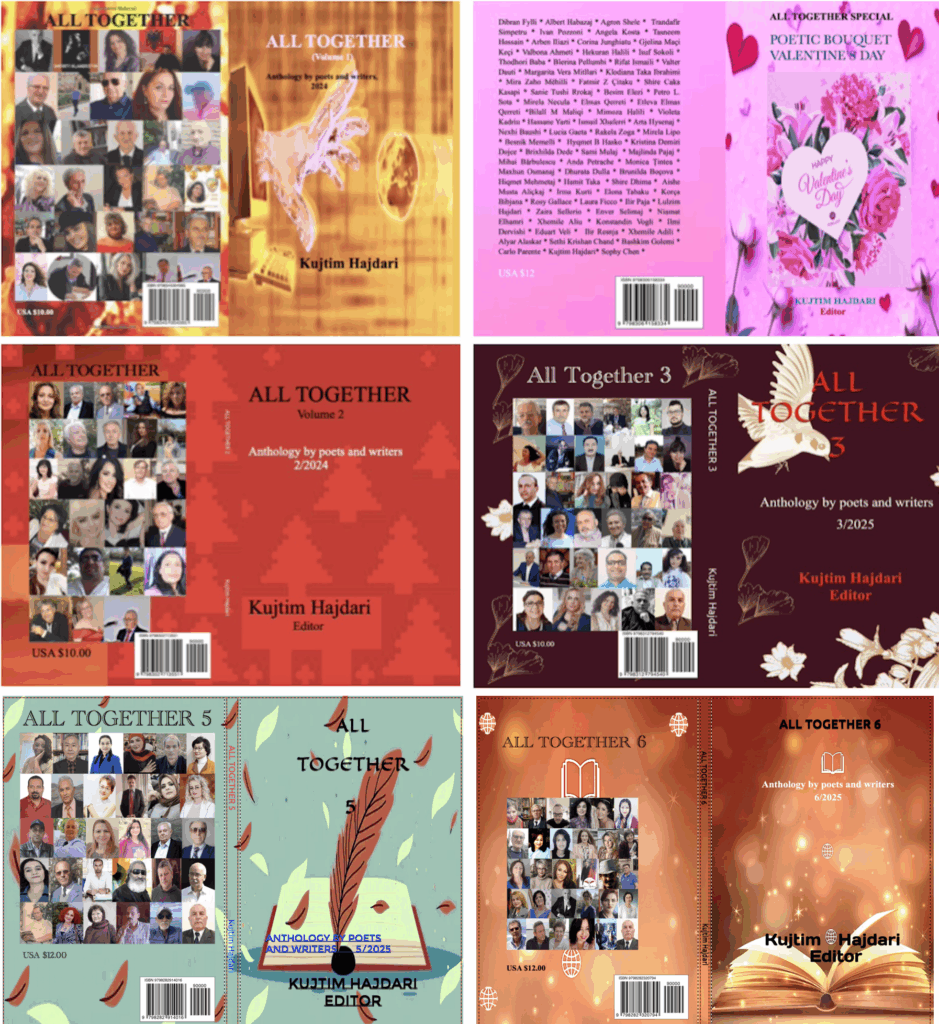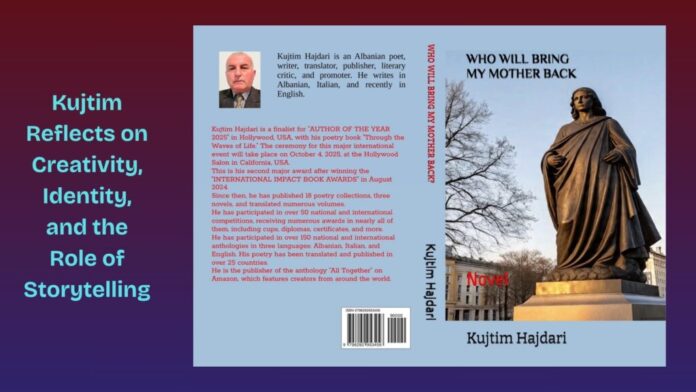nterview by Eris White, Multicultural Press
Kujtim Hajdari is no stranger to emotion, memory, and exile. A prolific Albanian writer and translator living in the United States, he is the author of numerous poetry collections, short stories, and now, a poignant novel titled Who Will Bring My Mother Back?. In this exclusive interview, we delve into the inspirations behind the book, his views on emigration, the creative process, and his vision for global literature.
PART I: INSPIRATION & IDENTITY
Eris White: “Kush ma kthen nënën?” (Who Will Bring My Mother Back?) is such a powerful and emotional title. How did this question arise in your life or mind?
Kujtim Hajdari: The question stems from a deep truth many of us face, especially those of us who have emigrated. In the rush of daily life – work, responsibilities, and survival, we often neglect our elderly parents when they need us most. And when they leave us, we carry the weight of guilt. Like the character in my novel, we ask: “Who will bring my mother, or father, back?” But there is no answer. They are gone. That pain and regret lingers forever.
EW: How autobiographical is this novel? Are Dritan and Luan inspired by your own life?
KH: Yes, the novel is quite autobiographical. While I tried to stay close to my parents while they were alive, Dritan and Luan’s experience of emigration mirrors my own. I have spent most of my life abroad, and the wounds they carry are mine as well.
EW: Was there a particular moment that pushed you to write this book?
KH: More than a moment, it was a collective reality I witnessed: post-communist Albania saw a mass emigration. Many parents spent their final years alone. And then I’d see their children build elaborate marble tombstones, too late. I could see sorrow in their eyes. That question, why now? – became the driving force for this novel.
PART II: THEMES & MEANING
EW: Your novel deals deeply with the post-communist transition in Albania. What message do you want to leave for younger generations who didn’t live through that era?
KH: I want them to feel what that era did to us. The collapse didn’t just change systems, it shattered families and uprooted lives. My message is simple: Don’t forget your parents amid your daily struggles. One day, when they’re gone, regret may be all that remains.
EW: The mother figure, Drita, is central to the novel. What does she represent to you?
KH: Drita symbolizes every mother who waited with sorrow and longing for her children to return. She embodies grief, strength, and enduring love. Sadly, many of these mothers pass away without ever seeing their sons and daughters again.
EW: You explore exile and return with great sensitivity. How do you experience this dilemma personally?
KH: I’ve lived abroad for over 30 years. Like Dritani, I’ve thought about returning home, but it’s complicated. Your children grow up, build their lives elsewhere, and it becomes hard to uproot again. The dilemma never leaves you: Do you return alone? Or stay and keep the family whole?
PART III: CRAFT & PROCESS
EW: Your writing style is clean, simple, and poetic. How did you develop your voice?
KH: It has evolved through experience, 18 poetry collections, short stories, translation work, and a background in literature and language. I’ve taught at the university level and participated in over 50 international literary events and competitions. All of that shaped my literary discipline.
EW: How long did this novel take to complete?
KH: It lived in my mind for about a year, changing often, scenes, title, even the ending. Once I committed to the structure, I wrote the draft in April, about 7–9 pages a day. Then I translated it into English in May and finalized it in June. I usually work 10–12 hours a day, so I could dedicate 3–4 hours just to the novel.
EW: Did you write it first in Albanian?
KH: Yes, and then translated it myself into English. I speak three languages, Albanian, Italian, and English. Though I’m still improving my English, I’ve translated many works and received good feedback. My poetry collection Through the Waves of Life even won a prize from the International Impact Book Awards.
PART IV: PUBLICATION & RECEPTION
EW: How has the response been so far, particularly from the Albanian diaspora?
KH: It’s early days, but the reaction has been wonderful. Many messages of support have come in, and I trust that momentum will grow.
EW: Any message or reader reaction that stood out?
KH: Yes, from Mr. Zekerija Idrizi in Germany—a renowned literary figure—who wrote a lengthy summary praising the book. That gave me confidence that I’d conveyed the story well.
MW: Publishing on Amazon is a big step. What has that journey been like?
KH: Publishing on Amazon makes the book available globally, especially in English. It’s challenging, especially the translation, which must feel organic, not mechanical. But the reach it offers makes it worthwhile.
PART V: TOWARDS NEW HORIZONS AND LIMITLESS POSSIBILITIES
EW: Do you plan to translate the book for wider international audiences?
KH: Yes, it’s already available in English on Amazon as Who Will Bring My Mother Back?. The Albanian version will be published soon.
EW: Is it part of a trilogy?
KH: No, though I may return to similar themes later. For now, this story stands alone.
EW: What’s next for you?
KH: Many projects: I plan to publish Kalvar Dashurie (Ordeal of Love), a novel about marriages of convenience. I’m also finishing a new poetry collection and working on a translation of 100 Selected Love Lyrics. And in August, I’ll refine Through the Waves of Life for the Author of the Year 2025 contest in Hollywood.
EW: If you had to define this novel in a single sentence, what would it be?
KH: No matter how busy life gets, never forget your parents—because after they are gone, your guilt and pain will stay with you forever.
PART VI: HONORS & ANTHOLOGIES
EW: Congratulations on being a finalist for Author of the Year 2025! What does this recognition mean to you?
KH: It’s deeply meaningful. It validates my work, encourages me to aim higher, and connects me with literary peers around the world. It’s not just my win—it’s a recognition of Albanian literature as well.
EW: Can you share the journey of the work that earned you this nomination?
KH: I submitted Through the Waves of Life to the International Impact Book Awards in early 2024. I had little hope, but in May, it was shortlisted, and by August, I was named a finalist. The feedback from the jury, especially about the translation quality, was moving. The award ceremony took place in Arizona, and now I look forward to October in Hollywood.
PART VII: “ALL TOGETHER” ANTHOLOGY
EW: Tell us about the anthology project “All Together.” What inspired it?
KH: I wanted to create a platform for international literary collaboration, especially for writers without financial means or access to digital tools. Since its first issue, it has grown rapidly and garnered wide interest.
EW: What message are you hoping to convey with the title “All Together”?
KH: Unity. We come together through literature to serve peace, creativity, and shared cultural growth.
EW: How do you select contributors?
KH: It’s a thoughtful process. We involve experienced critics, including myself, and review authors’ past works, competition results, and social impact. We prioritize quality and relevance.
EW: What can readers expect in the upcoming 7th issue?
KH: The theme is open, but summer, travel, and emotional renewal are of interest. Still, we welcome all impactful submissions.
PART VIII: REFLECTIONS ON LITERATURE
EW: As both a writer and editor, how do you manage these roles?
KH: I work over 12 hours daily, dividing my time between writing, critique, translation, and editorial tasks. I’m fortunate to have the support of global literary friends who help enrich each edition of the anthology.
EW: What qualities do you look for in a great poem or story?
KH: Artistic depth, societal relevance, and a message of peace, unity, or emotional truth. The work should resonate and uplift.
EW: How do you see literature’s role in bridging cultures today?
KH: Literature builds empathy, preserves heritage, challenges injustice, and connects us across differences. Through translated stories, global festivals, and collaborative spaces, we share what it means to be human.
EW: How has your multicultural experience shaped your writing?
KH: It has broadened my narrative structures, inspired experimentation, and deepened my cross-cultural understanding. I aim to write stories that transcend borders and foster dialogue.
PART IX: FINAL THOUGHTS
EW: Who has most influenced your writing journey?
KH: Everyday life, especially in Italy and the U.S., has shaped me. Discovering American literature and language played a decisive role in expanding my vision.
EW: What advice would you give to emerging poets and writers?
KH: Read global literature. Compare your work. Focus on universal themes. And always strive for artistic excellence.
EW: Any dreams or projects you’d like to share?
KH: We’re planning a new journal titled Getting to Know Writers and Poets from Around the World. I believe it will be a vibrant space for discovery, connection, and global literary conversation.
Interview by Eris White
Multicultural Press, Australia



